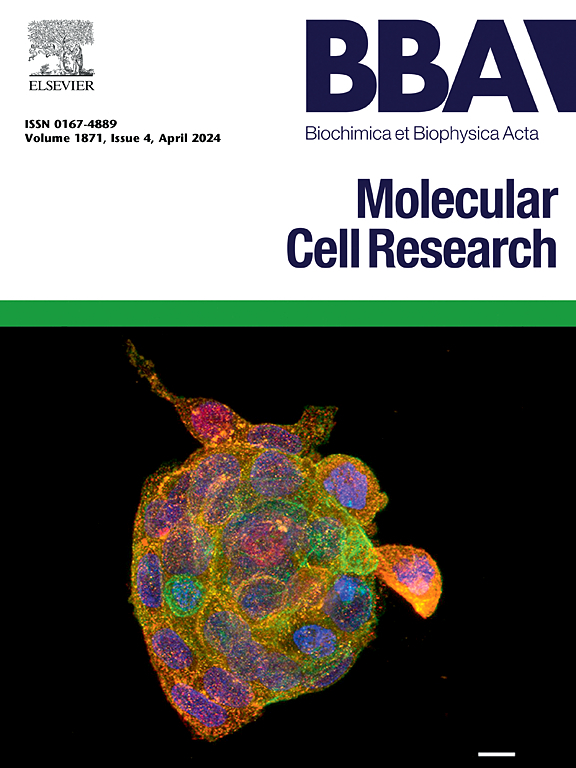蛋白转化酶subtilisin/ keexin 9型通过与环化酶相关蛋白1相互作用促进巨高蛋白溶酶体降解,参与顺铂诱导的急性肾损伤
IF 3.7
2区 生物学
Q1 BIOCHEMISTRY & MOLECULAR BIOLOGY
Biochimica et biophysica acta. Molecular cell research
Pub Date : 2025-05-06
DOI:10.1016/j.bbamcr.2025.119984
引用次数: 0
摘要
顺铂诱导的急性肾损伤(AKI)与相当大的死亡风险相关,因此迫切需要有效的预防和治疗策略来减轻其对患者预后的影响。越来越多的证据表明,使用蛋白转化酶枯草杆菌素/克辛9型(PCSK9)抑制剂evolocumab可显著降低AKI的风险,然而,其潜在机制仍然知之甚少。meggalin是一种内吞受体,在小管细胞中起着至关重要的作用。在本研究中,在顺铂诱导的AKI细胞和小鼠模型中,PCSK9表达升高,同时megalin表达降低。进一步实验发现,PCSK9过表达下调meggalin表达,促进小管损伤。此外,PCSK9抑制剂evolocumab抑制meggalin的损失,并防止尿蛋白水平、血尿素氮、血清肌酐和肾损伤标志物中性粒细胞明胶酶相关脂钙蛋白和肾损伤分子1的增加。在机制上,PCSK9通过环化酶相关蛋白1 (CAP1)和人白细胞抗原C (HLA-C)的协同作用与巨噬蛋白结合并促进其溶酶体降解。与evolocumab类似,CAP1缺失在体外和体内均可显著防止meggalin丢失并减轻小管损伤。总之,这些发现表明PCSK9和CAP1是顺铂诱导AKI患者的潜在治疗靶点。本文章由计算机程序翻译,如有差异,请以英文原文为准。
Proprotein convertase subtilisin/kexin type 9 contributes to cisplatin-induced acute kidney injury by interacting with cyclase-associated protein 1 to promote megalin lysosomal degradation
Cisplatin-induced acute kidney injury (AKI) is associated with a considerable risk of mortality, highlighting the critical need for effective preventive and therapeutic strategies to mitigate its impact on patients' outcomes. Mounting evidence suggests that administration of the proprotein convertase subtilisin/kexin type 9 (PCSK9) inhibitor evolocumab significantly reduces the risk of AKI, however, the underlying mechanisms remain poorly understood. Megalin is an endocytic receptor that plays a crucial role in tubular cells. In this study, elevated PCSK9 expression, accompanied by decreased megalin expression, was observed in cellular and murine models of cisplatin-induced AKI. Further experiments revealed that PCSK9 overexpression downregulated megalin expression and promoted tubular injury. Additionally, the PCSK9 inhibitor evolocumab inhibited megalin loss and protected against increases in urinary protein levels, blood urea nitrogen, serum creatinine, and the kidney injury markers neutrophil gelatinase-associated lipocalin and kidney injury molecule 1. Mechanistically, PCSK9 binds to megalin and facilitates its lysosomal degradation through the coordinated actions of cyclase-associated protein 1 (CAP1) and human leukocyte antigen C (HLA-C). Similar to evolocumab, CAP1 deletion significantly protected against megalin loss and mitigated tubular injury both in vitro and in vivo. Collectively, these findings suggest that PCSK9 and CAP1 are potential therapeutic targets for patients with cisplatin-induced AKI.
求助全文
通过发布文献求助,成功后即可免费获取论文全文。
去求助
来源期刊
CiteScore
10.00
自引率
2.00%
发文量
151
审稿时长
44 days
期刊介绍:
BBA Molecular Cell Research focuses on understanding the mechanisms of cellular processes at the molecular level. These include aspects of cellular signaling, signal transduction, cell cycle, apoptosis, intracellular trafficking, secretory and endocytic pathways, biogenesis of cell organelles, cytoskeletal structures, cellular interactions, cell/tissue differentiation and cellular enzymology. Also included are studies at the interface between Cell Biology and Biophysics which apply for example novel imaging methods for characterizing cellular processes.

 求助内容:
求助内容: 应助结果提醒方式:
应助结果提醒方式:


